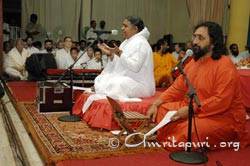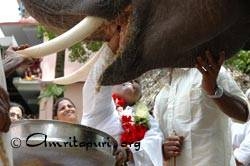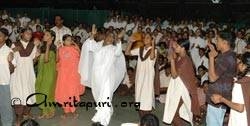15 September 2005 — Amritapuri

“All of you look like a beautiful pookkalam,” Amma said, looking down at the 10,000 or so people who had gathered at Amritapuri to celebrate Onam. Later, in her satsang, Amma explained that pookkalams, the multicoloured flower-petal mandalas of Onam, symbolize the confluence of hearts in society. “Pookkalam represent the unity of hearts. The unity of hearts is the beauty of society. Each flower has a beauty of its own, but when they come together their beauty multiplies. This is the true celebration of Onam.”
Amma explained how the saying “മാവേലി നാടുവാണീടും കാലം മാനുഷരെല്ലാരും ഒന്നുപോലെ Maveli nadu vaneedam kaalam manushar ellavarum onnu pole – [“During the time when Mahabali ruled, everybody lived as one.”], did not mean that during the time of Mahabali everyone was identical, but that society was functioning harmoniously, as everyone was adhering to their dharma.
Amma concluded her talk by saying that if we really want we can recreate such a world: “If we are all determined, we can create such a world. We can put an end to looting, killing, cheating and other forms of violence. Our world has enough resources to do so, but we are not using them correctly.” {read Amma’s Onam message}
Amma then sang “He Giridhara Gopala.” When she finished, she rose to her feet and asked everyone to join her in dance. No sooner had Amma stood up then a harmonium could be heard playing the melody of a traditional Kerala boat-racing song… which several years back one brahmachari converted into a bhajan about Amma: “Amrita Vahini.” { }

Everyone in the bhajan hall was clapping to the fast tempo of the bhajan and jumping up and down as Amma danced. As one devotee commented afterwards, “It was a real festival!”
When Amma was finished dancing, she sat down in meditation for several minutes. She then called the devotees for darshan. After giving darshan for an hour or so, she started serving Onam sadhya, the traditional Onam meal, to one and all. Ten thousands plates later, Amma got up and walked to her room, where two more devotees were waiting for their Onam prasad–Ram and Lakshmi, the ashram elephants. Amma fed them large balls of rice, banana chips and other treats.
Then, as Amma was giving payasam to Ram, she commented that it was too watery and, therefore, difficult to serve. She asked for a metal cup, so that she could pour the sweet pudding into Ram’s mouth. The first time Amma’s hand disappeared into Ram’s mouth, it came back out without the cup. Amma immediately starting yelling, “Tuppada! Tuppada!” [“Spit it out! Spit it out!”]. A few seconds passed, as everyone anxiously waited to see if Ram would really swallow the metal cup. But after he had made sure the cup was empty, he obliged Amma by spitting it out onto the floor. In unison, everyone let out a sigh of relief and had a good laugh.

It was only a few hours later that Amma returned to the hall. It was 6:00 p.m.–a half hour before the bhajan was scheduled to start. Why had she come? She wanted to spend some more time with the children who were visiting from the Ashram’s orphanage in Parippally. Soon Amma was dancing with about 30 children in a wide circle.
amma dancing with the children of Parippally
Many of the children from Parippally are Vanavasis [tribals] from Northern Kerala, and as such they love sharing their tribal dances and songs with Amma. Together, they did several different dances. When she was finished, Amma began the evening bhajan.
For the final song of the night, Amma sang a very old bhajan, “Bhakta Vatsale Devi Ambike Manohari.” Amma became so lost in the bhava of the song that it seemed she would never finish. For the next half-hour Amma called out into the night, singing every single one of the song’s 27 verses. Amma never once opened her eyes, the words just poured forth, unstoppable, like a tsunami. O Devi who showers motherly love upon her devotees! Mother! Enchanter of the Mind! May you dwell here in order to end the suffering of the people!
—Kannadi
